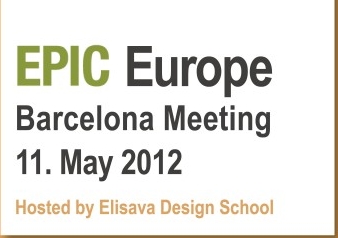Hay que empezar la casa por los cimientos, o en este caso explicando: EPIC son las Ethnographic Praxis in Industry Conferences, las conferencias anuales nacidas en 2005 para que los antropólogos industriales, corporativos, los practitioners de la antropología compartamos experiencias, casos, buenas prácticas y un etcétera tan largo como necesario. Hace cuatro meses, un grupo de asistentes a las conferencias EPIC (Catriona Macaulay, Joan Vinyets y Heinrich Schwarz, entre otros) se convencieron de que sería muy interesante lanzar un evento que, con el espíritu de EPIC, se centrara en las prácticas de la etnografía industrial en Europa.
Y no se equivocaron. En absoluto.
Al poco de aterrizar en las conferencias (en la sede del ELISAVA en Barcelona, un espacio con relación asentada con la etnografía y que nos acogió muy bien), me di cuenta de que mi experiencia previa no cuadraba con lo que estaba viviendo, porque la mayoría de las conferencias y encuentros a los que he asistido eran de antropólogos y para antropólogos, o compartidas con nuestros primos los sociólogos. En este caso los antropólogos éramos una leve mayoría relativa, lo que resulta refrescante al comprobar el interés de otros especialistas por la etnografía.
Por si eso fuera poco, EPIC se centra en el impacto de la etnografía en las corporaciones, en lo que aporta nuestra pasión a distintas necesidades de nuestros clientes.
La verdad, no estaba preparado para dejar de sentirme sólo en segundos. Es difícil describir la sensación que produce escuchar a tus colegas hablar de problemas como los tuyos que encuentran soluciones creativas, o escuchar historias como las tuyas de perseverar llamando a puertas hasta que se abren y la etnografía empieza a aportar valor a los clientes.
Tras una jornada previa en la que rompimos el hielo, vino el plato principal: una sesión del viernes 11 en la que se trataron 3 temas principales mediante una combinación de panel y mesas de conversación distribuida. Después de dividirnos en 4 aulas diferentes, un facilitador lanzaba a un grupo de 4 mesas (más o menos 25 participantes en total por cada aula) una serie corta de preguntas sobre el tema que estábamos tratando, lo discutíamos y se hacía una síntesis que devolvíamos al salón de actos. Algo de todo esto lo tuiteamos en #epiceurope
Los temas fueron:
- Mapping Ethnographic Practice in Europe
- Evolving Industry/Academia Collaboration
- Ethnography and the Corporation
In order to introduce #EPICEurope event, we could say that the awareness that EPIC has raised about ethnographic services at companies and corporation has been translated into a single event which is centered on specific European problems and opportunities related with ethnography. Time ago, some EPIC veterans (including Catriona Macaulay, Joan Vinyets and Heinrich Schwarz, between others) concluded that it would be very compelling and fertile to launch an event that, with the EPIC spirit, would be centered on the practices and evolution of applied and industrial ethnography in Europe.
And they were totally right, of course.
Soon after arriving to the event (which took place on ELISAVA School of Design, a very adecuate environment for it), I realized that my previous experiences were quite far from what I was experiencing then. The majority of the encounters and meetings that I have assisted were of anthropologists and for anthropologists or, at most, shared with our cousins the sociologists. In this case, we anthropologists were a slight relative majority. It was refreshing to perceive the increasing interest of other specialists in ethnography.
As if that were not enough, EPIC focuses on the impact of corporate ethnography, on what our passion brings to different needs of our customers.
I was not ready to stop feeling alone in a couple of minutes. It is difficult to describe the experience of listening your colleagues talk about problems like yours which find creative solutions, or to hear stories like yours of knocking on cold doors once and again until ethnography enters and begin to add unique results to customers.
After a evening for breaking the ice for some of us, the main event was a very demanding one-day session in with we covered three main topics combining panels with distributed conversations. After creating 4 temporal groups, we went to classrooms. There, a facilitator launch us a simple script for organizing the topic into a short list of questions in which discussions were based. We shared the results of the discussions and returned with it to the main auditorium for share it again with the entire EPIC assistants.
Topics are well covered in experientia’s blog, for instance.
All the results were organized into a Prezi presentation, which I will repost as soon as I know that it is published.
My strongest feeling was of ending an era and the beginning of a new one: the end of crossing the desert and the arrive to fertile lands for us European industrial ethnographers. Although applied ethnography is less implanted than in America, although a lot of achievements are yet needed, time has come for industrial ethnography in Europe as a wide demanded research service. It was even more convinced that the ball is on our roof, that it is up to us that our customers identified clearly what is not ethnography (“I record interviews with a camera on the users’ living room”) and how to distinguish it from what us anthropologist and properly trained practitioners do with our tool set, our being in the field, our obsession for context and our relationship with informants.
The next day, as a conclusion, we unanimously decided to give continuity to this first effort and repeat this European EPIC encounters. It has been a unique experience to discover the many problems and opportunities we German, French, Spanish, Italian ethnographers share… it was the opposite situation of the classical joke of national stereotypes.
Next year, in a sunny place!

